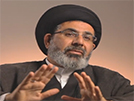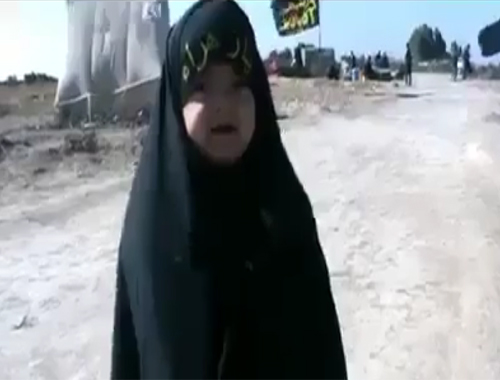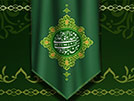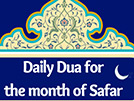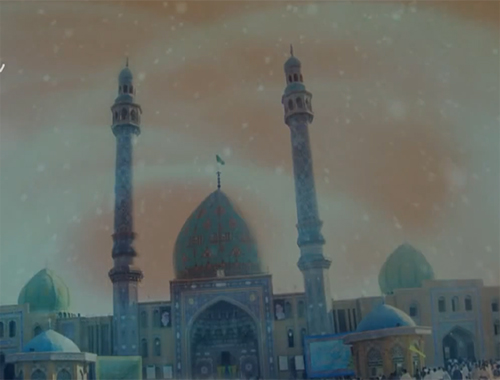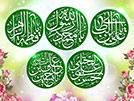PART 3 - Glossary
- Details
- Hits: 2445
PART 3 - Glossary
Bismillah al-Rahmaan al-Raheem
PART 3 - Glossary
Bismillah al-Rahmaan al-Raheem
| Aba | The usually black cloak worn by women in Arab countries as the means of hijaab or part of. |
| Arafaat | An area outside the holy city of Makkah and beyond Mina and Mash?ar al-Haraam. |
| Arafah | Day of Arafah is the ninth day of Dhil-Hejjah, when woquf is observed in Arafaat from midday until sunset in solitude supplication and intimate discourse with the Almighty. This day is considered to be of supreme significance to the extent that the hadith states, ?the Hajj is Arafah?. |
| Adhaan | The call to the daily obligatory prayers. |
| Adnal-hill | The nearest point to the Haram where one can be without ihraam, or the nearest point to the Haram where one can declare and assume ihraam. |
| al-Tan?eem | Reference to Masgid al-Tan?eem, or the al-Tan?eem mosque, which also serves as a miqaat for Umrah al-Mufradah. |
| al-Tashreeq | Reference to al-Tashreeq days / nights, which are the 10th, 11th, 12th of Dhil-Hejjah. |
| Anbar | A substance that releases scent when burnt. |
| Arafaat | A district outside the holy city of Makkah, where the pilgrim must observe woquf there between noontime and sunset. |
| awrah | Areas of the body that are obligatory to be covered. In the case of a male, it is area from the abdomen, around the navel level, to the knees. In the case of a female, it is the entire body. |
| Dhil-Hejjah | The twelfth month of the Islamic lunar calendar. Also written as Dhul-Hejjah. |
| Dhil-Qa?dah | The eleventh month of the Islamic lunar calendar. Also written as Dhul-Qa?dah. |
| Dirham | A unit of currency used during the Islamic era, which is still used as a currency unit in Fiqh discussions. Ten Dirhams is equivalent to one Dinaar, which is equal to one mithqaal, which is equal to 3.153 grams of gold. Thus one Dirham is equal to 0.3153 grams of gold, or one-hundredth of an ounce of gold. |
| Du?a | Supplication. |
| Eid | Festival / Celebration. |
| Fajr | The start time when the sky begins to lighten up. It is normally one-and-a-half to two hours before sunrise, depending on the geographical coordinates of the locality. |
| Farsakh | Unit of length measurement, which is about 5.5 km, or 3.4 miles. |
| Ghusl | The complete head-to-toe wash. Some ghusl are obligatory and some are optional. A ghusl becomes mandatory for both husband and wife every time they engage in penetrative sexual intercourse. It is also obligatory for a man if semen discharge occurs outside sexual intercourse. A ghusl is also obligatory for a woman after the end the menses period, before she can resume her various acts of worship. |
| Ha?edh | A woman who is experiencing the monthly menstruation. |
| Had?y | The Sacrifice that is offered on the day of Eid in Mina. |
| Hadath | Any discharge of urine, faeces, semen, or wind is referred to as hadath. |
| Hadith | Narration of the saying of the prophet or the imams alayhum-as-slaam. |
| Hajj | Pilgrimage. |
| Hajjar al-Aswad | The Black Stone, placed in a corner of the sacred Ka?bah. |
| Hajjat-al-Islam | The Pilgrimage of Islam. |
| Halaal | Permitted. |
| Halq | Shaving. |
| Haraam | Illegal, prohibited, forbidden. |
| Haram | The Sacred, or the Sanctuary. This is in reference to the area that encompasses the holy city of Makkah. |
| Haydh | The monthly menstruation period. |
| Hemyaan | A belt that is permitted for men to wear during ihraam. |
| Hijamah | Bloodletting or cupping that is performed in order to extract ?bad? blood from the body. |
| Hijr Isma?el | The stonewall of Isma?el, a few meters from the Ka?bah. |
| Ihraam | The state of consecration that the pilgrim assumes in which s/he refrains from a number of particular acts seeking forbearance, pleasure and adornment in humility before Allah Almighty. |
| InSha?Allah | By the will of Allah. |
| Istighfaar | Seeking forgiveness from Allah Almighty. |
| Jabirah | Wound dressing. |
| Jamaa?ah | Congregation. |
| Jamaraat | Plural for Jamara, the three obelisks representing the three appearances Satan made to Prophet Ibrahim alayhis-salaam, in an attempt to discourage him from executing the orders of Allah Almighty. |
| Jamarat-al-?Aqabah | Also known as the Jamarat-al-Kubra, itis the third obelisk ? representing the temptation of Satan ? that is stoned on the days of Eid and the following two days. |
| Janaabah | One is in the state of Janaabah whenever engages in sexual intercourse with one?s spouse. A man is in a state of Janaabah whenever seminal discharge occurs. |
| Ka?bah | The cubic building that is the symbolic House of Allah Almighty. Also referred to as Bayt-al-Haraam. |
| kaffaarah | Compensation, atonement for breaching prohibited acts, or failure to do something obligatory. Plural kaffaaraat. |
| Khatam | Traditional ring. |
| Khums | Meaning one-fifth, Khums is the contribution of 20 % of the annual superfluous un-Khumsed income. |
| Ma?soomeen | Meaning the infallible or impeccable individuals, this is a reference to the Prophet Muhammad, his daughter Fatima, and the twelve imams, the first of whom is Imam Ali, and the twelfth, Imam Mahdi alayhum-as-salaam |
| Mabeet | Literally meaning to remain, this is one of the rites of the Hajj, which is required to observe in Mina. |
| Madhhab | Sect. |
| Maghrib | The time for maghrib prayer. Maghrib is the time when the redness of the central part of the sky, which is visible during the time of sunset, vanishes. Maghrib is some ten to twenty minutes after sunset, depending on the geographical location. |
| Mahram | Two people are said to be mahram if there is no hijaab restriction between them, like husband and wife, or mother and son, or father and daughter, brother and sister, etc. |
| Makruh | Discouraged, undesirable, etc. |
| Manaasik | Rites. |
| Masgid al-Haraam | The Grand Mosque, which houses the Ka?bah. |
| Masgid al-Shajarah | A mosque outside the holy city of Medina, which serves as the miqaat for the pilgrim heading to Makkah from the city of Medina. |
| Mash?ar al-Haraam | Also known as Muzdalafah, it is an area between Arafaat and the holy city of Makkah. |
| Meetah | Meat of an animal that has not been slaughtered in an Islamic way, or that has died or been killed in other ways. |
| Mina | An area in the vicinity of the holy city of Makkah where mabeet is observed. |
| Miqaat | A designated place that pilgrims must declare and assume ihraam from. |
| modd | A unit of weight equivalent to 750 grams approximately. |
| moqassir | Moqassir means one who does not know the ruling regarding certain aspect (of a religious duty) and he is aware of this ignorance or shortcoming and where to find the answer for, e.g. through certain books, references, or individuals with the appropriate expertise, but does not make the effort to seek the answer. In this way he has failed to discharge his duty. For comparison also see Qaasir. |
| mostatee? | Literally means able, and when used in reference to the Hajj program, one is considered as mostatee? if s/he is physically and financially able to perform the Hajj as well as meeting other prerequisites. |
| Mu?min | The faithful, the believer. |
| muhrim | An individual who is in the state of ihraam. |
| mostahab | Encouraged, desirable. |
| Muzdalafah | Another name for Mash?ar al-Haraam |
| nadhr | Vow. |
| nafilah | Literally meaning extra, or optional, it refers to acts of worship that are not mandatory for the individual to perform, but one is encouraged to do so, such as the nafilah associated with each of the daily obligatory prayers, or the Night nafilah, etc. |
| nagis | The definition of something being ?filthy? or ?impure? by coming into contact with a source of impurity, such as urine, faeces, semen, blood, wine, dog, pig, etc. Antonym of taahir. |
| niyyah | Literally meaning the intention, it refers to having or making the right intention for an act of worship and it is obligatory for any act of worship. Normally it is not necessary to verbally state the intention and it is sufficient that one make a mental note of act that one intends to do, unless otherwise stated. |
| qaasir | Qaasir means one who does not know the ruling of a certain aspect of a religious duty, but in fact he is not aware of this ignorance and naturally does not seek the answer to the case concerned since he believes that what he is doing is correct. Thus one should not assume that what he is doing is always correct, and ensure to check with reference books or expert individuals. As a matter of fact it is imperative and obligatory for the individual to learn and know all aspects that s/he may come across in the course of one?s life concerning the relevant issues. |
| qadha? | If an obligatory act of worship was not performed when it was due, it must still be performed past its time as qadha or ?missed?. |
| rak?ah | A cycle or round of prayer in any of the daily prayers. |
| ram?y | Literally, it means to throw, and in the Hajj rites, this refers to stoning of the obelisks. |
| rukn | A principal element. |
| Sa?y | The Hajj rite relating to requirement of covering the distance between the mounts of Safa and Marwah, by walking or otherwise, seven times. |
| Safa | One of the two mounts ? now almost vanished ? in the vicinity of the Ka?bah. |
| sahar | The second part of the night, from midnight to fajr. |
| salaat | Arabic for prayers. |
| Salaat al-Tawaaf | Tawaaf prayer. |
| sawm | Fasting. |
| Shaam, | The area including Syria, Lebanon, and Jordan. |
| Shawwal | 10th month of the Islamic lunar calendar. |
| Shi?a | Literally meaning follower, it is traditionally used to refer to the Muslims who follow Imam Ali alayhis-salaam as the leader of the Muslims after Rasulollah salla-llahu-alayhi-wa-aalih, in compliance with the order of the prophet. Rasulollah salla-llahu-alayhi-wa-aalih specifically appointed Imam Ali alayhis-salaam as his caliph and successor on specific instructions from Allah Almighty. |
| Sughra | The Lesser. |
| Sunnah | Tradition or teaching (of the prophet). |
| Tahaarah | The state of purity or being in a state of wudhu. |
| Taahir | ?Pure? ? as opposed to nagis. |
| Talbiyah | Means compliance, fulfilment, or carrying out the orders of Allah Almighty. |
| Taqseer | Trimming. |
| tawaaf | One of the Hajj rites, which is to walk around Ka?bah seven rounds. |
| Tawaaf al-Widaa? | The Farewell Tawaaf |
| Tawaaf al-Ziyaarah | Also known as the Hajj Tawaaf, which is the first rite of Makkah after Mina. |
| Tawaaf al-Nisa | The Women Tawaaf. It is obligatory to both male and female pilgrims, regardless of their age, status, etc. A husband would not be halaal to his wife unless he performs this tawaaf, and vice versa. |
| Tayammum | The means of attaining the state of wudhu by using earth or dust as opposed to water, where water is either not available or it is harmful to use. |
| wali | Guardian, heir |
| Warce | A kind of perfume |
| Wilaayah | authority and governorship |
| Wudhu | Ablution or the ritual washing required prerequisite for the performing of the obligatory daily prayers. |
| Woquf | The mandatory rite of ?being? in the two sites of Arafaat and Mash?ar al-Haraam as part of the Hajj program. |
| Wusta | Middle. |
| Zakat | Literally means purification, it is the religious duty of contribution of a rate of 1 ? 2.5% due to nine items when over certain threshold. The nine items are Wheat, Barley, Dates, Raisins, Camel, Cow, Sheep, Gold, and Silver. |
Other Publications by
fountain books
1. Fundamentals of Islam In this book the author outlines the five fundamental principles of Islam, namely Tawheed (the Indivisible Oneness of God), Adl (Divine Justice), Nubowwah (Prophethood), Imamah (Leadership of mankind), and Me?ad (Resurrection). For each principle, the author presents a brief, and to the point, discussion on the significance of the issue concerned. The book could serve as a good introduction to Islamic beliefs.
2. What is Islam? Beliefs, principles and a way of life Few would dare to attempt to summarize the Islamic faith in a book of this size but this is the aim of the late Grand Ayatollah Muhammad al-Shirazi, one of the most eminent Islamic authorities of modern times. Eschewing complicated jargon and deliberately using succinct and lucid language within a "question and answer" format, he has sought to convey the richness and profound spirituality of the Islamic message in all its aspects to the widest possible audience. There are necessarily some Arabic and technical terms but these have been kept to a minimum. The late Sayyid Shirazi covers all the main aspects of Islam, from the fundamental beliefs such as the Oneness of God and His justice and prophethood to topics like ablutions, praying, fasting, and making the Hajj and also deals with such diverse subjects as Islamic law, economics, politics, the Islamic view of society, the issue of freedom in Islam, and so on. This is a book which will not only be useful for Muslims who want to find out more about their religion but also for non-Muslims who seek a concise introduction to what Islam is all about.
3. The Family In this book the author highlights the problems he sees both in Islamic societies and in west societies today that arise from the phenomenon of unmarried young men and women, through to birth control and contraception. He surveys the idea of marriage in various religions and schools of thought, and discusses polygamy from the Islamic perspective. As well as being a call to the Muslim world to revert to the true teachings of Islam, this book can also be of use as an introduction to others who seek some answers to the social problems of today. This is because Islam provides detailed teachings that promise success in every area of human life on individual and societal levels, and furthermore the practicality and success of those teachings have been proven in the course of history.
4. The Qur?an: When was it compiled? In this book the author addresses the issues of when the Holy Qur?an was compiled, on what and whose instructions was this task carried out, and who accomplished its compilation in the form that it is available today. In this work the author presents undisputable evidence as to address these crucial questions. Through historical, methodical and logical analyses, the author establishes how and when the compilation of the Holy Qur?an was achieved. In the latter half of the book the author cites many Prophetic traditions (hadith) on the significance of the learning and recitation of Holy Qur?an. It is a must read for every Muslim, and any non-Muslim who follows Islamic issues.
5. The Bible and Christianity: an Islamic view In this work the author carries out a brief investigation into the Bible and presents his findings. They show that some of the most noble men, i.e. the Prophets, who have been chosen by God Almighty as His messengers to mankind, are accused in the Bible to have committed some of the most vile and immoral conducts known to man. Prophets are accused of deception, lying, fornication, rape, incest, murder, and the list goes on. Even God does not escape unscathed in the Bible . . . false characteristics are attributed to Him, or He is accused of making His messengers to commit foul and disgusting acts. In the second part of this work the author presents some of the debates he had with the Christians who visited him in his residence in Karbala, Iraq. The debates concerned their impression of Islam and its doctrine as well as their own religious beliefs. In this presentation the author shows how he invited non-Muslims to Islam through calm but rational and intellectual debates with them. The book makes an interesting read, especially when the reader can see the simple arguments put forward in these debates.
6. If Islam were to be established This book can serve as the Muslim's guide to the Islamic government. If an Islamist opposition group has a plan for an Islamic government, this book would help to check various aspects of the plan. In the absence of such a plan, this book would present one. To the non-Muslims, the book presents a glimpse of a typical Islamic system of government. The book would also serve as a yardstick for anyone to check the practices of any government that claims to have implemented an Islamic system of government.
7. War, Peace and Non-violence: An Islamic Perspective In this work the author addresses three controversial issues, which have come to be associated with Islam. Through his extensive knowledge of the teachings of Islam, the author presents the Islamic stand on war, peace and non-violence, as found in the traditions and teachings of the Prophet of Islam, which could serve as exemplary models for the Mankind. Detailed accounts of the traditions of Prophet in his dealings with his foes during war or peace times are presented in this book, which gives the reader a clear insight into the way and the basis upon which the Prophet of Islam used to conduct his affairs in this respect.
8. The Islamic System of Government In this introductory book the author outlines the basic principles of a government based on the teachings of Islam. The author begins with the aim and objectives of the government according to Islam and the extent of its authority in that framework. He then addresses, from the Islamic viewpoint, the significance and fundamental nature of such issues as consultative system of government, judicial system, freedoms, party political pluralism, social justice, human rights, foreign policy, etc. The author also outlines the policies of a government on issues such as education, welfare, health, crime, services, etc. as well as such matters as the government's income, and authority.
9. Islamic Beliefs for All In this book the author discusses the five fundamental principles of Islam. These principles are Tawheed or the Indivisible Oneness of God, Adl or Divine Justice, Prophethood, Imamah or the Leadership of mankind after the prophet, and Resurrection. What distinguish this book are the author's subtle approach in addressing the issues concerned and the simple examples given to illustrate the discussion. This authoritative work is not only important to Muslims, but it would also be of interest to those non-Muslims who seek to explore Islam and its doctrine. This easy to read book would be a valuable reference for Religious Education.
10. Husayn - The Sacrifice for Mankind This is a collection of articles about a totally unique individual who, through his remarkable sacrifices, managed to change the course of history and the direction that mankind was heading for. He is none other than Husayn, the grandson of the Prophet of Islam, Muhammad, and the second son of Fatima and Ali, peace be upon them. Imam Husayn peace be upon him stood up to tyranny and oppression and gave everything he had, including his life and the lives of his most beloved sons and brothers as well as those of his closest allies, in order to awaken the masses, reform society and rectify the distortion that has been inflicted on Islam. The articles in this work cover some aspects of the aims and objectives of Imam Husayn?s movement, the difference between his strategy and that of his brother Imam Hasan in facing tyranny and despotism, the examples he set, and the lessons that are learnt from the events that lead up to Karbala fourteen centuries ago. Besides the benefits of his movement, the personality of Imam Husayn peace be upon him as reflected by the many hadith and teachings of Prophet Muhammad is also discussed. Also included in this work are a number of questions and answers about the commemoration ceremonies observed by the Muslims around the world on the occasion of Ashura.
11. The rights of prisoners according to Islamic teachings In general, Islam considers imprisonment as a case of last resort in many circumstances, however, according to Islamic teachings there are only a few offences that would lead to imprisonment. Under non-Islamic system, of course the offender should be reprimanded, but any chastisement prescribed by Islamic teachings may only be implemented if all the relevant criteria and the preconditions prescribed are also met. If the criteria are not met, then the prescribed punishment may not be executed. In this book the author addresses such issues as the fundamental nature of freedom, the rights of prisoner, and the harmful effects of imprisonment on the individual concerned as well as on society, and the kind of offences that would lead to imprisonment under an Islamic system. The author also cites a few cases to demonstrate the attitude the Islamic ruler should take towards offence; to try to find reasons to waive the punishments in any particular case. The author also addresses the issue of torture in general, and mental and physical ill treatment that is carried out under the guise of interrogation and extracting confession from a detainee or a suspect.
12. Aspects of the political theory of Imam Shirazi Muhammad G. Ayub is a well-known Islamist political activist within the Iraqi circle who has established a long history of political struggle over the past three decades. He was attracted by the views of the Imam Muhammad Shirazi in the fields of social and political sciences. This prompted the author to write this book to introduce the reader to these views that have remained relatively unknown amongst Muslim activists and reformists. It covers such aspects on politics as freedom of expression, party-political pluralism and organisation, social justice, peace and non-violence, human rights, consultation system of government, etc.



